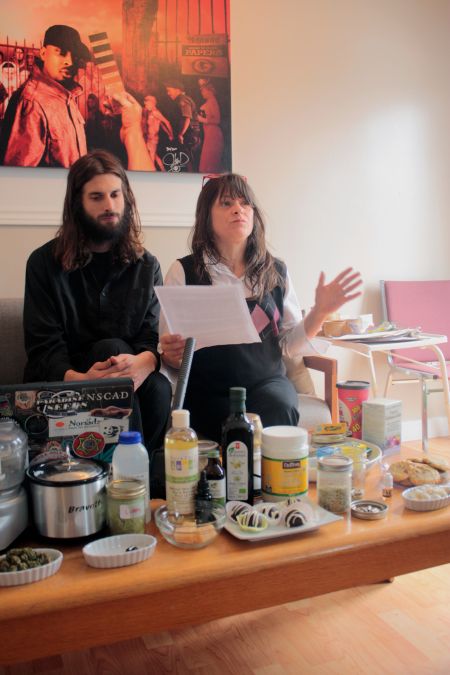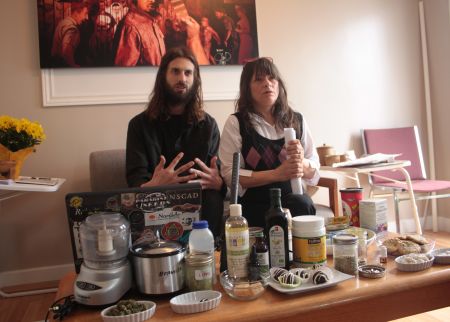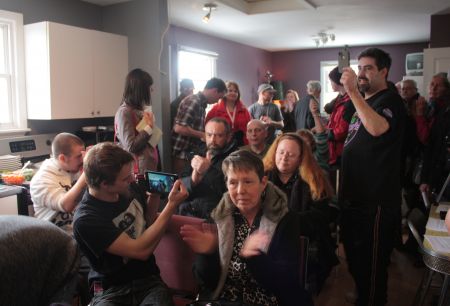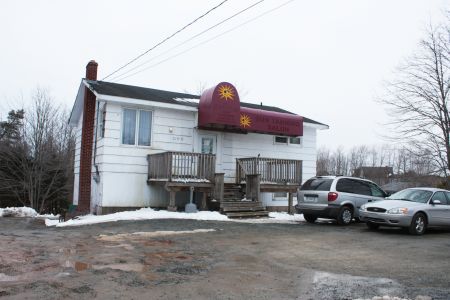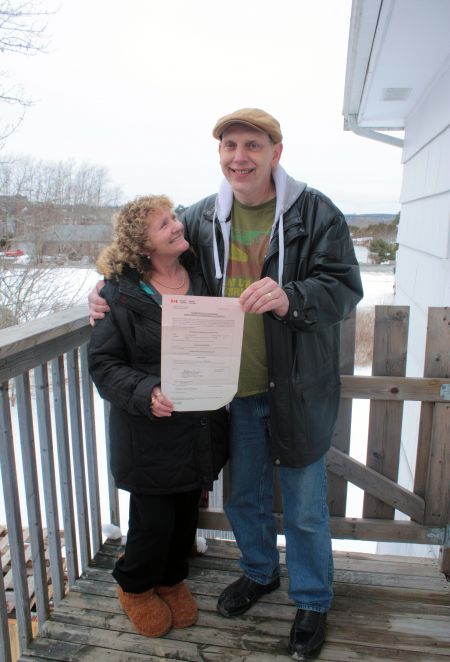A mix of sweet incense and marijuana smoke hung like a fine Nova Scotia fog inside the Halifax Compassionate Club on March 21. Members smoking fat joints leaned on the kitchen counter talking quietly in pairs. The countertop held a fruit and veggie platter and a vaporizer, and on a table nearby sat an emptying box of Timbits.
Reporters filtered in. Two mellow dogs sniffed the newcomers. About 25 people, including club supporters and a local Liberal nomination hopeful, crammed into the room. The modest two-storey commercial building is a five-minute walk down the gravel shoulder of the road from a Porters Lake strip mall featuring an NSLC and pharmacy.
Club president Sherri Reeve, also known as marijuana activist “Four-Twenty Jes,” looked over her notes as she and club vice president Chris Enns waited for CBC to set up their camera. The coffee table at their knees held an assortment of cannabis products and edibles, including THC-infused truffles and a bowl of about 10 grams of dried cannabis.
Given the all clear, Reeve began to read from a press release.
“The Halifax Compassionate Club, Grow-Op Garden Supply and the private residence of Chris Enns were raided by the Halifax Regional Police integrated drug unit Wednesday, March 13, 2013 in Porters Lake,” Reeve read.
That afternoon, she said, 12 police officers in black and blue vans pulled into the club’s muddy parking lot on Highway 7 in Porters Lake. In fact, it was an RCMP operation, HRP chief of police Jean-Michel Blais said Wednesday.
Using a warrant, they entered the former tanning salon and confiscated “medicine belonging to several patients” and thousands of dollars from the Grow-Op Shop downstairs, Reeve said. They also searched Enns’ private residence on East Chezzetcook Road.
Enns, 28, was charged with three counts of possession of marijuana, hash and psilocybin mushrooms for the purpose of trafficking, and one count of cultivation of marijuana. Tyler Julien, 25, and Brianna Wharton, 31, were each charged with one count of marijuana possession for the purpose of trafficking.
Enns and Julien are co-owners of the Grow-Op Shop.
Officer Jamie Payne, the investigator who led the raid, had recently joined the club, claiming to have a medical ailment, Reeve said. She described the raid as “peaceful.”
RCMP spokesperson Scott MacRae could not confirm details of the event, or discuss any investigative techniques used during the raid. However, he said police seized $50,000 in cash along with 10 pounds of cannabis, about 1,000 capsules believed to contain hash oil, and unknown quantities of marijuana shake and psilocybin mushrooms.
The capsules were filled with cannabin and coconut oil, Reeve said on Facebook.
Did the club toe the line or cross it?
MacRae said the club did not have the legal authority to dispense marijuana.
Enns said the club “absolutely” operated in a legal grey area.
In Canada, if a patient obtains a medical marijuana license, they can either grow it themselves, or fill out an application for someone to grow it for them. A licensed grower cannot produce marijuana for more than two people.
If they produce more than necessary for two people, they are legally obligated to destroy the excess, Enns said.
Enns said he is licensed to grow marijuana.
Licensed marijuana growers donate surplus yield to the club, he said.
“It comes from a host of sources, and probably one of the most moving things is when a patient does come in and say, ‘I have extra from my garden, can you use this for the cancer clinic?’”
The compassionate club (also known as the THC Club) distributes the marijuana to hundreds of members, he continued, and cancer patients receive the cannabis for free.
“The primary focus of this centre, starting up, was always the cancer patients,” Enns said. “That’s who we believe receive the most benefit, and that’s why they receive their medicine free of charge. A great deal of the operating revenue that is generated here goes toward helping them access that medicine.”
The club brochure says it provides “safe access to quality medicine at affordable rates to those with a verifiable physician’s recommendation and a THC Club membership.” Membership is free, it states.
In some cases, the club “helps people out” if they have a medical ailment but don’t yet have a license, a club member who didn’t want to be named said.
After a patient obtains a license, it can still take months to grow and dry the marijuana, Enns said, so the club offers consulting services to people who are seeking a license.
There was illegal activity in the club because passing a joint is illegal, Reeve said, addressing the charges.
Club members out of luck
Former machinist and current cancer patient Oliver Glattfelver said he paid $5 to $7 a gram for the club’s cannabis. But he won’t be able to buy it there anymore.
The club has stopped “providing dispensing services,” though it will remain open, Reeve said. She advised members to bring their licenses and carry a moderate amount of medicine.
Glattfelver has been off work for about a year due to his incurable, inoperable prostate cancer. Last May he got a medicinal marijuana license to deal with the pain and nausea that accompanies radiation and chemo.
“I never had pain much with my cancer, but now it’s reared its ugly head and it’s pushing against nerves and stuff, so there’s a couple tumors they want to zap and shrink,” he said. “It’s strictly for pain.”
He talked to his doctor and within two weeks he received a license in the mail. His license allows him to grow, not buy, which initially led him to the Grow-Op Shop.
He says someone at the shop clued him in to the club upstairs (there is a stairwell between the two levels). That’s how Glattfelver began attending the Wednesday cancer nights.
“It was clean product; good. Didn’t have to go on the streets to try to find buddy or somebody else,” he said. “It was fantastic.”
“You can feel pretty confident that it’s clean; organic. They inspect the product pretty closely before they actually sell it. You’re never sure what you’re getting sometimes on the street, whereas here I can feel confident I was getting good product.”
Now, Glattfelver smokes about a gram a day. His license entitles him to carry 90 grams on his person, which for him is a three-month supply.
He called the police raid on the club “a travesty.”
“It wasn’t necessary,” he said.
Now, he’ll either have to pay more for weed on the black market, or grow it himself. But growing isn’t really an option for him because of the months it would take, he said. “I’m not sure how much time I have left.”
“What am I going to do? I’m going to have to revert back to the way it was before this came into my life, which is basically through friends.”
“We’ve already had dozens of patients coming to the door looking for services and we’ve had to turn them away,” Enns said. “They end up in tears saying, ‘What am I going to do? I’m now going to have to go to the black market. I’m now going to have to go back to the dealer I used to know who ripped me off.’”
Enns and the two others charged are scheduled to appear in court in June. Enns said he would be representing himself in court.
